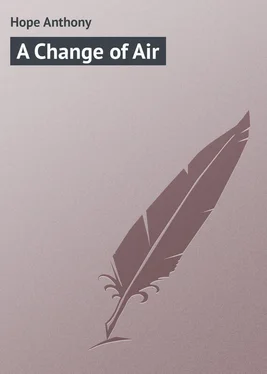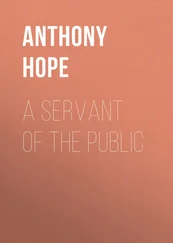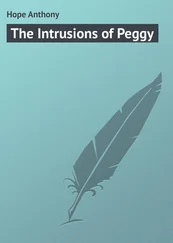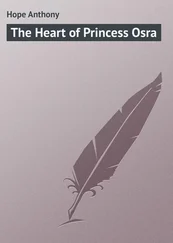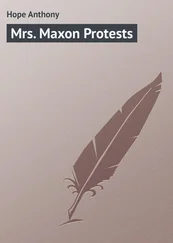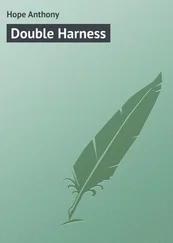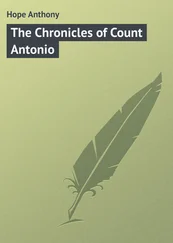Anthony Hope - A Change of Air
Здесь есть возможность читать онлайн «Anthony Hope - A Change of Air» — ознакомительный отрывок электронной книги совершенно бесплатно, а после прочтения отрывка купить полную версию. В некоторых случаях можно слушать аудио, скачать через торрент в формате fb2 и присутствует краткое содержание. Жанр: foreign_prose, на английском языке. Описание произведения, (предисловие) а так же отзывы посетителей доступны на портале библиотеки ЛибКат.
- Название:A Change of Air
- Автор:
- Жанр:
- Год:неизвестен
- ISBN:нет данных
- Рейтинг книги:4 / 5. Голосов: 1
-
Избранное:Добавить в избранное
- Отзывы:
-
Ваша оценка:
- 80
- 1
- 2
- 3
- 4
- 5
A Change of Air: краткое содержание, описание и аннотация
Предлагаем к чтению аннотацию, описание, краткое содержание или предисловие (зависит от того, что написал сам автор книги «A Change of Air»). Если вы не нашли необходимую информацию о книге — напишите в комментариях, мы постараемся отыскать её.
A Change of Air — читать онлайн ознакомительный отрывок
Ниже представлен текст книги, разбитый по страницам. Система сохранения места последней прочитанной страницы, позволяет с удобством читать онлайн бесплатно книгу «A Change of Air», без необходимости каждый раз заново искать на чём Вы остановились. Поставьте закладку, и сможете в любой момент перейти на страницу, на которой закончили чтение.
Интервал:
Закладка:
"I suppose," he said in reply to an appeal from Tora, "that a man has a right to please himself in such things."
"After all papa has done for him! Besides, Sir Harry, you know a doctor ought to be particularly careful."
"What is there so dreadful about Mr. Bannister?" asked Tora. "He looks very nice."
"Have you seen him, Tora?" asked Janet eagerly.
"Yes; we met him riding on such a queer old horse. He looked as if he was going to tumble off every minute; he can't ride a bit. But he's awfully handsome."
"What's he like?"
"Oh, tall, not very broad, with beautiful eyes, and a lot of waving auburn hair; he doesn't wear it clipped like a toothbrush. And he's got a long mustache, and a straight nose, and a charming smile. Hasn't he, Sir Harry?"
"I didn't notice particularly. He's not a bad-looking chap. Looks a bit soft, though."
"Soft? why, he's a tremendous genius, papa says."
"I didn't mean that; I mean flabby and out of training, you know."
"Oh, he isn't always shooting or hunting, of course," said Tora contemptuously.
"I don't suppose," remarked Janet, "that in his position of life, – well, you know, Tora, he's of quite humble birth, – he ever had the chance."
"He's none the worse for that," said Sir Harry stoutly.
"The worse? I think he's the better. Papa is going to ask him here."
"You're quite enthusiastic, Tora."
"I love to meet new people. One sees the same faces year after year in Denshire."
Sir Harry felt that this remark was a little unkind.
"I like old friends," he said, "better than new ones."
Janet rose to go.
"We must wait and hear papa's report," she said, as she took her leave.
Tora Smith escorted her to the door, kissed her, and, returning, said, with a snap of her fingers:
"I don't care that for 'papa's report.' Jan is really too absurd."
"It's nice to see her – "
"Oh, delightful. I hate dutiful people!"
"You think just as much of your father."
"We happen to agree in our opinions, but papa always tells me to use my own judgment. Are you going to see Mr. Bannister?"
"Yes, I think so. He won't hurt me, and he may subscribe to the hunt."
"No; he may even improve you."
"Do I want it so badly, Miss Smith?"
"Yes. You're a weak-kneed man."
"Oh, I say! Look here, you must help me."
"Perhaps I will, if Mr. Bannister is not too engrossing."
"Now you're trying to draw me."
"Was I? And yet you looked pleased. Perhaps you think it a compliment."
"Isn't it one? It shows you think it worth while to – "
"It shows nothing of the kind," said Tora decisively.
Thus, for one reason or another, from one direction and another, there was converging on Littlehill a number of visitors. If your neighbor excites curiosity, it is a dull imagination that finds no plausible reason for satisfying it. Probably there was more in common than at first sight appeared between Mr. Delane's sense of duty, the Mayor's idea of official courtesy, Colonel Smith's contempt for narrowness of mind, Sir Harry Fulmer's care for the interests of the hunt, and Dr. Roberts' frank and undisguised eagerness to see and speak with Dale Bannister face to face.
CHAPTER IV.
A Quiet Sunday Afternoon
To dissolve public report into its component parts is never a light task. Analysis, as a rule, reveals three constituents: truth, embroidery, and mere falsehood; but the proportions vary infinitely. Denborough, which went to bed, to a man, at ten o'clock, or so soon after as it reached home from the public house, said that the people at Littlehill sat up very late; this was truth, at least relative truth, and that is all we can expect here. It said that they habitually danced and sang the night through; this was embroidery; they had once danced and sung the night through, when Dale had a party from London. It said that orgies – if the meaning of its nods, winks, and smiles may be summarized – went on at Littlehill; this was falsehood. Dale and his friends amused themselves, and it must be allowed that their enjoyment was not marred, but rather increased, by the knowledge that they did not command the respect of Denborough. They had no friends there. Why should they care for Denborough's approval? Denborough's approval was naught, whereas Denborough's disapproval ministered to the pleasure most of us feel in giving gentle shocks to our neighbors' sense of propriety. No doubt an electric eel enjoys itself. But, after all, if the mere truth must be told, they were mild sinners at Littlehill, the leading spirits, Dale and Arthur Angell, being indeed young men whose antinomianism found a harmless issue in ink, and whose lawlessness was best expressed in meter. A cynic once married his daughter to a professed atheist, on the ground that the man could not afford to be other than an exemplary husband and father. Poets are not trammeled so tight as that, for, as Mrs. Delane remarked, there was Byron, and perhaps one or two more; yet, for the most part, she who marries a poet has nothing worse than nerves to fear. But a little lawlessness will go a long way in the right place, – for example, lawn-tennis on Sunday in the suburbs, – and the Littlehill party extorted a gratifying meed of curiosity and frowns, which were not entirely undeserved by some of their doings, and were more than deserved by what was told of their doings.
After luncheon on Sunday, Mr. Delane had a nap, as his commendable custom was. Then he took his hat and stick and set out for Littlehill. The Grange park stretches to the outskirts of the town, and borders in part on the grounds of Littlehill, so that the Squire had a pleasant walk under the cool shade of his own immemorial elms, and enjoyed the satisfaction of inspecting his own most excellent shorthorns. Reflecting on the elms and the shorthorns, and on the house, the acres, and the family that were his, he admitted that he had been born to advantages and opportunities such as fell to the lot of a few men; and, inspired to charity by the distant church-bell sounding over the meadows, he acknowledged a corresponding duty of lenient judgment in respect of the less fortunate. Thus he arrived at Littlehill in a tolerant temper, and contented himself with an indulgent shake of the head when he saw the gravel fresh marked with horses' hoofs.
"Been riding instead of going to church, the young rascals," he said to himself, as he rang the bell.
A small, shrewd-faced man opened the door and ushered Mr. Delane into the hall. Then he stopped.
"If you go straight on, sir," said he, "through that baize door, and across the passage, and through the opposite door, you will find Mr. Bannister."
Mr. Delane's face expressed surprise.
"Mr. Bannister, sir," the man explained, "don't like visitors being announced, sir. If you would be so kind as walk in – "
It was a harmless whim, and the Squire nodded assent. He passed through the baize door, crossed the passage, and paused before opening the opposite door. The sounds which came from behind it arrested his attention. To the accompaniment of a gentle drumming noise, as if of sticks or umbrellas bumped against the floor, a voice was declaiming, or rather chanting, poetry. The voice rose and fell, and Mr. Delane could not distinguish the words, until it burst forth triumphantly with the lines:
"Love grows hate for love's sake, life takes death for guide;
Night hath none but one red star – Tyrannicide."
"Good gracious!" said Mr. Delane.
The voice dropped again for a few moments, then it hurled out:
"Down the way of Tsars awhile in vain deferred,
Bid the Second Alexander light the Third.
How for shame shall men rebuke them? how may we
Blame, whose fathers died and slew, to leave us free?"
Интервал:
Закладка:
Похожие книги на «A Change of Air»
Представляем Вашему вниманию похожие книги на «A Change of Air» списком для выбора. Мы отобрали схожую по названию и смыслу литературу в надежде предоставить читателям больше вариантов отыскать новые, интересные, ещё непрочитанные произведения.
Обсуждение, отзывы о книге «A Change of Air» и просто собственные мнения читателей. Оставьте ваши комментарии, напишите, что Вы думаете о произведении, его смысле или главных героях. Укажите что конкретно понравилось, а что нет, и почему Вы так считаете.
